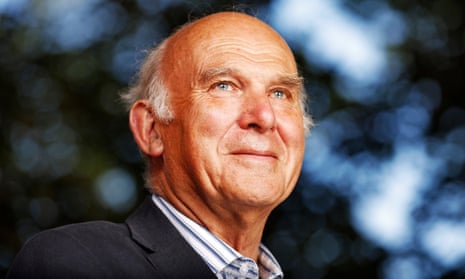The former Liberal Democrat minister Vince Cable has broken ranks with his party to argue that it is politically necessary to limit immigration from the EU as part of the UK’s Brexit deal.
While stressing he was still firmly against leaving the EU, Cable argued that one of the few potential benefits would be “the opportunity for a more rational immigration policy” – including a limit on entrants from the EU.
“There is no great argument of liberal principle for free EU movement; the economics is debatable; and the politics is conclusively hostile,” Cable wrote in the New Statesman. “The argument for free movement has become tactical: it is part of a package that also contains the wider economic benefits of the single market,” he argued.
Cable’s comments were swiftly disowned by the Lib Dems. A party spokesman said: “Vince’s views are his own, he is not a member of parliament and he does not speak for the party.”
However, his intervention is a further indication of the fast-changing nature of the immigration debate. Labour has been particularly affected, as considerable differences over immigration policy have emerged in the views of leading party figures during Brexit discussions.
While the shadow home secretary, Diane Abbott, has vigorously defended free movement, her predecessor, Andy Burnham, has called for Labour to prioritise immigration control over access to the EU’s single market.
Meanwhile, the shadow Brexit secretary, Keir Starmer, has proposed “reasonable” controls on numbers entering the UK, without going into detail of what this would mean.
Cable, who was the MP for Twickenham for 18 years until 2015 and was business secretary under the previous coalition government, argued that while his instincts were still to defend free movement, the political reality was now different.
“I have serious doubts that EU free movement is tenable or even desirable,” he said, arguing that it was selective in that other nationalities already faced “complex and often harsh visa restrictions”.
While mass immigration made economies bigger and aided business owners, Cable said the argument of an economic benefit to the wider population was harder to justify.
“The economic arguments are not conclusive but, on balance, favour some net migration of younger, skilled workers,” he said. “More liberal Brexiteers concede that point.
“It is also reasonable for Remainers to accept that there should be controls, as for non-EU migrants. That is also where public opinion is. Long-term social survey analysis suggests that the demand for effective immigration control coexists with greater tolerance of diversity.”
While arguing that the government should still prioritise access to the single market, “that may not be possible to reconcile with restrictions on movement”, Cable said. If that proved the case, he said the next-best option would be to remain in the wider customs union status.
